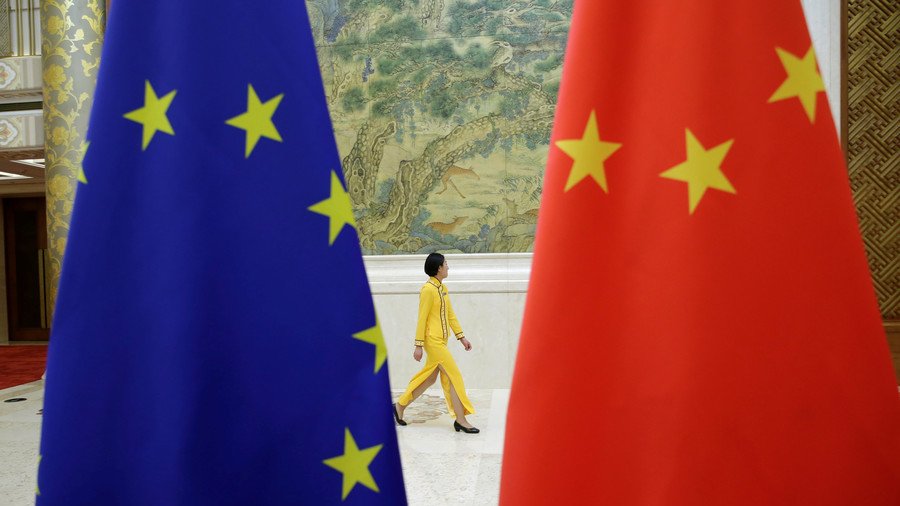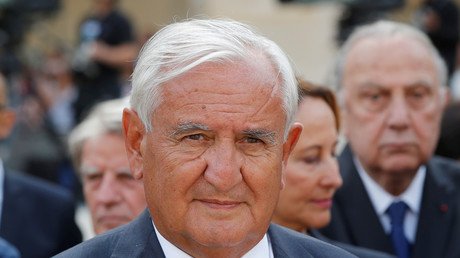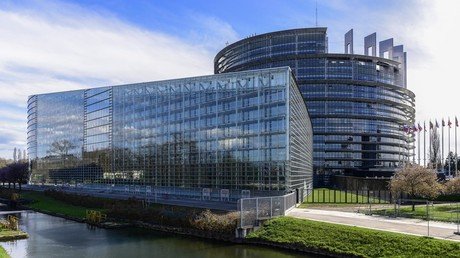Chinese officials have reportedly been cozying up to their EU counterparts, promising members of the 28-strong bloc to open the Chinese market in return for putting up a united front against the US in the World Trade Organization.
China has been actively seeking an ally in the EU in a potential trade war with Washington, with senior Chinese officials offering European nations an access to its market if they take Beijing's side in the looming showdown, Reuters reported, citing European diplomats and officials.
China's top officials, Vice Premier Liu He and top diplomat State Councillor Wang Yi have carried out a series of meetings in Brussels, Berlin as well as in Beijing, touting an alliance between the two economic powerhouses.
One of the proposals floated by the Chinese envisaged China and the EU joining forces at the World Trade Organization against the US, which might also see them initiating a joint action against Washington at the WTO, the agency reported.
Given that the relations between the US and its European allies, which were strained after Trump slapped the EU with import tariffs on steel and aluminum, remain in a rough place, the timing of the Chinese proposal seems sensible.
"Trump has split the West, and China is seeking to capitalize on that. It was never comfortable with the West being one bloc," a European diplomat engaged in the Sino-EU diplomacy told Reuters, while another one called the Trump's demarche at the G7 summit in Canada a gift to China.
However, five diplomats that spoke to the agency on the issue have said that, despite all grievances that the EU holds against Washington, the EU leaders turned down the proposal.
"China wants the European Union to stand with Beijing against Washington, to take sides," one diplomat said, as cited by the agency, adding that the EU made it clear to Beijing it won't accept the tradeoff.
The Chinese officials were testing the ground ahead of the Sino-European summit, scheduled to take place in Beijing on July 16-17. It has been reported that the Chinese PM hinted in private meetings that China will use the summit to outline sectors of the Chinese economy that European investors will be allowed to pump their money into, for the first time.
As China apparently failed in its attempt to persuade the EU to abandon the US, no breakthrough is expected at the summit, the officials said.
Less than a month has passed since the G7 summit debacle in Canada, which saw the US leader walk out of the joint communique last-minute and alienating allies with his tough rhetoric on trade. However, it seems that Trump does not intend to tone down his rhetoric with the Western allies, reprimanding NATO countries who missed the joint defense spending target of two percent of their GDP.
Several countries, including Germany, Canada, Spain, the Netherlands, and Italy have confirmed they have received letters from Trump urging them to step up their financial contributions. It was reported that all NATO member states have received similar correspondence in the run-up to the upcoming summit in Brussels, which is taking place on July 11-12.
Since taking office, Trump has repeatedly voiced his dismay with what he sees as the unwillingness of European nations and Canada to share the burden of the common defense.
"NATO members must finally contribute their fair share and meet their financial obligations," Trump said at a NATO summit last year, adding that the fact that "twenty-three of 28 member nations" were paying less than two percent of their GDP "is not fair to the people and taxpayers of the United States."
Washington has been the major contributor to NATO, having spent some 3.6 percent of its GDP on common defense last year.
However, the US allies that have already increased spending under Washington's pressure last year dismissed the accusations that their contribution is inadequate, with Italian Prime Minister Giuseppe Conte saying that "contribution aren't measured just in economic terms," and Spanish Foreign Minister Josep Borrell noting that "the letter doesn't add anything to what we already talked about with President Trump in person."
Meanwhile, the European Parliament on Tuesday has, for the first time ever, approved the establishment of the European Defense Fund (EDF), with a budget of some €13 billion ($15 billion). The fund's aim is to provide financial assistance to the EU defense companies in development of "new and upgraded products and technologies," to make EU-wide defense spending "more efficient."



